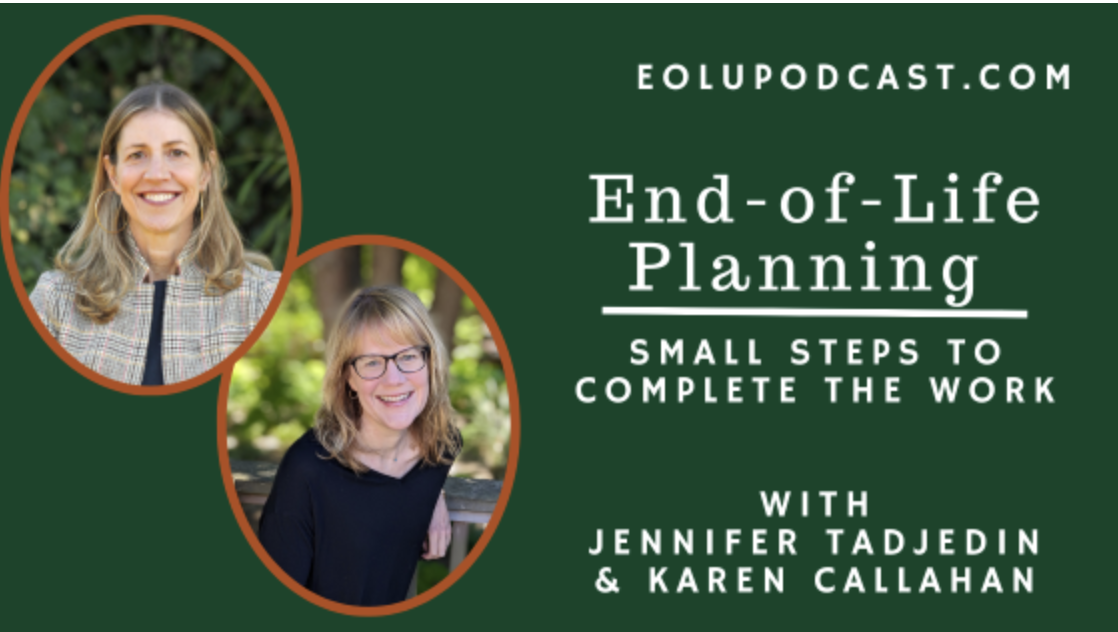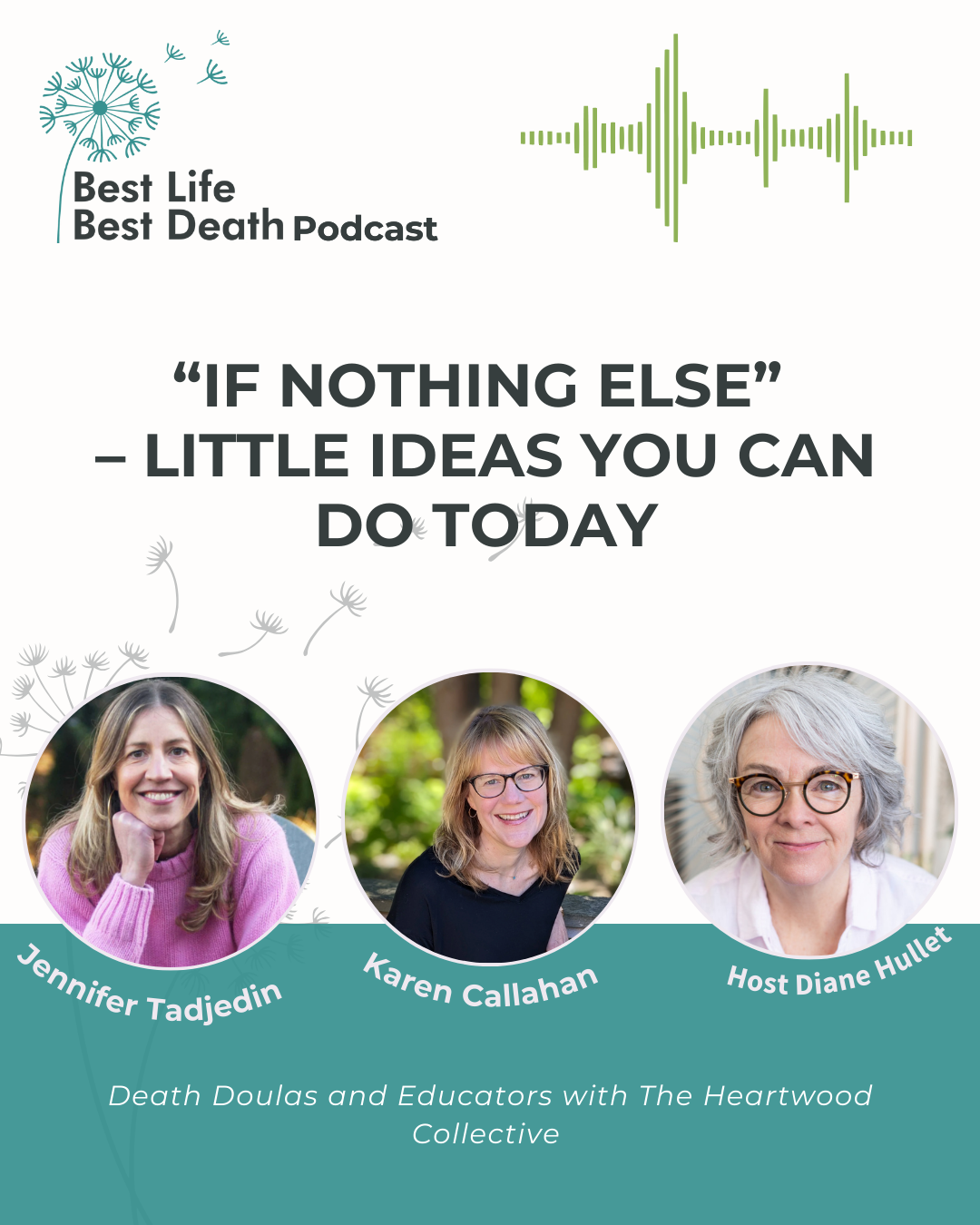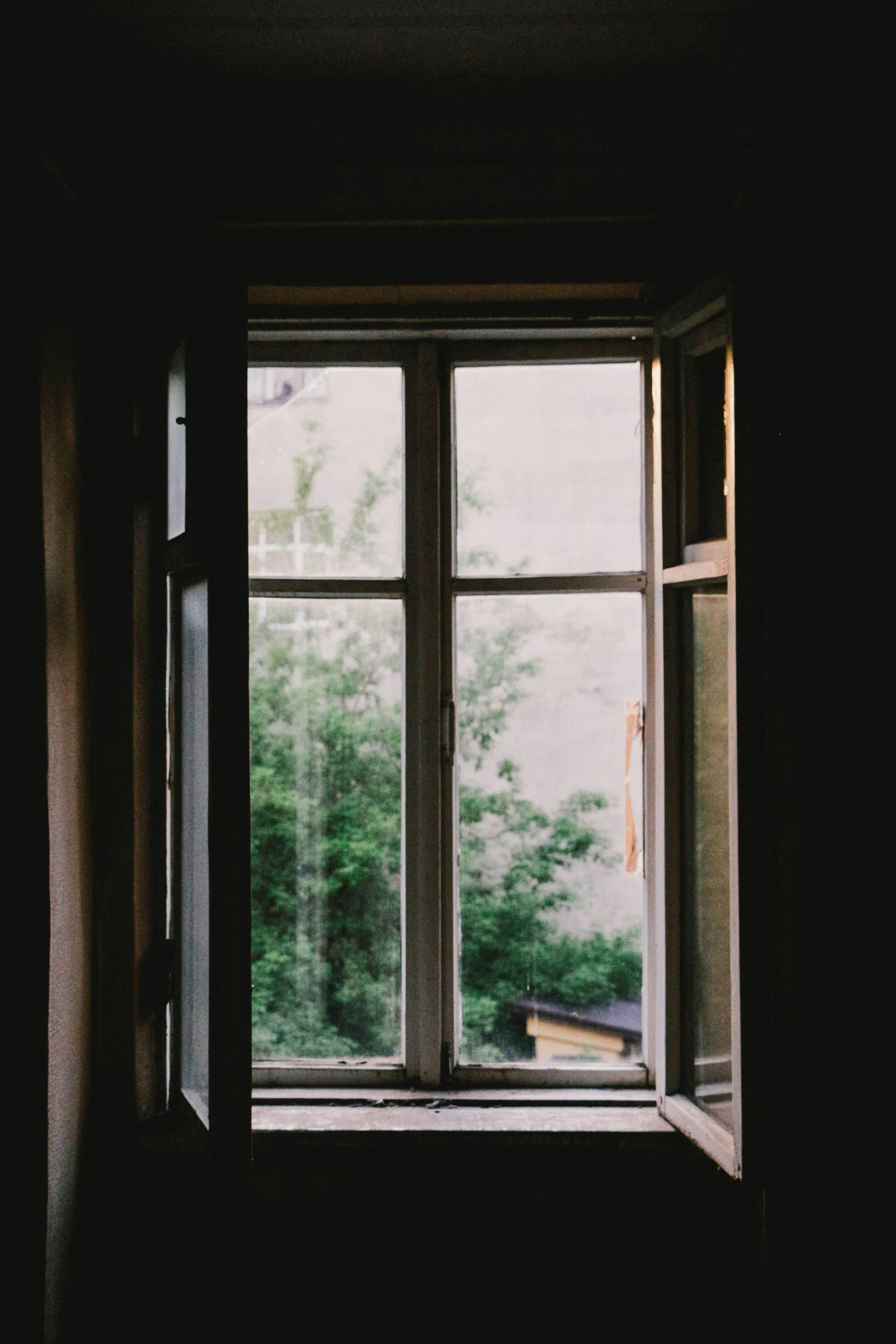Our interview with Dr. Karen Wyatt
November 12, 2025
Friends,
Jen and I are thrilled to have been guests on Dr. Karen Wyatt’s podcast, End-of-Life University.
Dr. Wyatt, a retired hospice physician, is a pioneer in our field (note we were on Episode 526 — she’s been talking about death for a long time!). We talked about how we came to work together, and how working through end-of-life planning tasks can help ease some of the fear associated with thinking about and talking about death.
Here’s the episode on her website. Also: Spotify, Apple, YouTube.
As always, please share with anyone you know who may be interested!
Medical Aid in Dying
October 27, 2025
Medical Aid in Dying (MAID) has been in the news recently. New York is on track to become the 13th state (plus DC) to legalize MAID. While that is still only a quarter of the country, more and more states are allowing MAID, and two states (Oregon and Vermont) have gotten rid of their residency requirement, so patients can come in from out-of-state to take advantage of the law.
I live in Oregon, the first state to pass the Death with Dignity Act in 1997. I also volunteer with an organization that supports people who have chosen MAID to end their life. Often the clients who avail themselves of the law have spent months or years suffering from a life-threatening and debilitating disease.
The Death with Dignity Act allows these people the option to die on their own terms in the presence of loved ones. Through my volunteer work, I’ve attended a handful of planned deaths. They’ve all been beautiful, calm, and peaceful. These people have chosen to end their lives on a particular date and time, it’s more likely that affairs are in order, conversations have been had, loose ends have been tied up.
Not anybody can choose to do this. There are strict guidelines and several checks and balances before an individual is eligible for the medication that will end their life. But for the right candidate, even just having the option to choose MAIDcan bring relief. Roughly one-third of those who obtain the medication end up not taking it, but having it in hand can cultivate a sense of calm and agency.
While I’ve always felt that this is an important choice that people should be able to make under the right circumstances, I have become an even greater proponent after the deaths I’ve witnessed. Granted, if I could choose to go naturally while taking an afternoon nap (something my 90-year-old grandmother did), then absolutely sign me up for that. But, having lost family members to horrible, strung-out battles with cancer, I’d rather have this option to preserve some sense of control over my suffering.
I know that support for Death with Dignity is divisive and, to some, deeply offensive. But I wanted to share my experience of how it has strengthened my support in favor of one’s right to choose MAID. The gratitude and relief clients and family members share — knowing the suffering they have endured will finally come to an end — is a powerful thing to see.
The scent of memory
October 6, 2025
Friends,
Not long ago, I received a text from my mom. She had just said goodbye to her beloved dog, Tulia—an aging companion who had filled her home (and heart) for many years. Anyone who’s lost a pet knows that moment when you're faced with the quiet aftermath: the bowls, the beds, the toys that once meant everything now feel like painful reminders of what’s missing.
My mom told me she was ready to let go of most of Tulia’s things. The beds were gone. The bowls too. But then she added something I didn’t expect: she was keeping a bottle of Tulia’s dog shampoo—because she thought that if she used it on her own hair, she might be able to hold onto Tulia’s scent just a little longer.
My first thought?
Wow, Mom… that's kind of crazy.
But as I sat with it, I realized: it’s not crazy at all. It’s profoundly human.
Scent, like music, is one of the most powerful memory triggers we have. Both have the uncanny ability to transport us instantly—to a moment, a person, a feeling we thought had faded with time.
For me, the song “We Built This City” by Starship will always, always bring me back to Sarah, one of my closest childhood friends, who passed away eleven years ago. No matter where I am or what I’m doing, if that song comes on, it stops me in my tracks. I'm suddenly 16 again, windows down, laughing with Sarah on a warm summer night.
Smell holds that same power. As Vladimir Nabokov once wrote, “Nothing revives the past so completely as a smell that was once associated with it.”
I can smell my grandmother’s kitchen in a jar of bread and butter pickles.
I can hear my dad’s voice on a Sunday evening with the scent of liverwurst pâté.
These smells don’t just remind me—they connect me. To memory, to presence, to home.
So when my mom said she wanted to use Tulia’s shampoo, I saw it differently. It wasn’t just about clinging to the past—it was about comfort. And really, what harm is there in holding onto something that brings a smile—or a tear—when your heart is heavy?
Grief doesn’t follow a straight line. It’s textured, unpredictable, and deeply personal. Sometimes it shows up in the form of a song on the radio. Sometimes it lingers in the smell of dog shampoo on a towel. And sometimes, wrapping ourselves in those sensory memories can feel like a warm blanket on a cool evening—reminding us that love never really leaves, it just changes form.
Listen to us on the Best Life, Best Death Podcast
September 25, 2025
Friends,
We’re very excited to share our first podcast appearance!
We recently recorded an episode with Diane Hullet, host of one of our favorite podcasts: Best Life, Best Death. (Of course that’s one of our faves.)
We chatted with her about our journeys into this work and gave her listeners some of our top tips on end-of-life planning. We called these the “If Nothing Else” tasks.
Here’s the episode on her website. Also: Spotify, Apple.
Please share with anyone you know who may be interested. Word-of-mouth from our community is so helpful to us as we continue to grow.
How One Family Broke the Ice on End-of-Life Planning
September 5, 2025
We often hear from people that our workshop makes them think of their parents and the conversations that need to be had and planning they may or may not have completed. This was the case with one of our first workshop participants who was willing to share the story of her family.
Laurie knew—even before she attended—that there were definitely some end-of-life considerations her parents hadn’t yet thought about. Like many older adults, her parents assumed they were “all set,” but she also knew they might be resistant to anything that sounded like a class about death. Still, Laurie hoped that by attending the workshop herself and sharing the insights and benefits she gained, they might be more open to the idea.
And she was right.
After completing the workshop, Laurie visited her parents with the workshop materials in hand, ready to gently start the conversation. She shared her own experience—what she had learned, the questions she hadn’t thought to ask, and the clarity she gained from going through the course herself. She flipped through the materials with them and walked them through a few key topics.
What happened next surprised her.
Instead of brushing off the discussion, her parents listened. They saw the materials and realized they might not be as prepared as they had assumed. The conversation unfolded more easily than Laurie had anticipated, and she knows that her own comfort with the topic played a big role in that. She wasn’t tiptoeing around the subject; she was inviting them into it.
One simple, yet effective, nudge that helped was offering her parents a “family discount” for attending the workshop together. That extra incentive made it feel less like a class about death and more like a shared, valuable investment in their family’s peace of mind.
Before, end-of-life planning had been a subject avoided in the family. But now, her parents proudly tell people that they have pre-arranged their cremation with the Neptune Society.
The Peace of Mind Planning workshop gave the family the tools, language, and confidence to have difficult conversations about death.
Thanks to the workshop, they’re more prepared—together.
If you’ve been wondering how to open this conversation with your own parents or adult children, let this be a gentle nudge.
Whether you attend solo or with loved ones, the Peace of Mind Planning workshop can help make these important discussions easier, clearer, and even comforting.
See our new fall and spring dates for Peace of Mind Planning.
Meditating on grief
August 12, 2025
Jen and I often get asked about supporting people who are grieving. Since much of our work focuses more “upstream” – the preparation and planning for death – I tend to shy away from talking too much about grief as an “expert”. While I have my personal experience with grief from losing both of my parents, I will direct people to therapists or grief specialists.
However, I do feel comfortable recommending books that have moved me, especially memoirs in which the author articulates their confusing, sad, and messy emotions in ways that I find beautiful, like Kathryn Schultz’s Lost & Found. (Ezra Klein recently interviewed Schultz on his podcast if you want a taste of her story and its broader relevance to the time we’re living in).
I also recommend the Sojourn Into Grief series that my dear friend Daryll wrote about losing his dad. (He did not ask me to say this.)
Daryll wrote these pieces in the first nine months after his dad died. One of the things that I think make them so powerful is that middle-distance perspective – they capture the confusion of someone a little removed from the acute shock, but still really in it. He shares a eulogy, meditates on grief as an emotion, and explores “the terror of meaninglessness.”
I would recommend this to people who have recently lost someone and people who are supporting someone who has lost someone. Grief can be so different for everyone, but understanding what someone could be grappling with in that first year after a death can help build a bridge during a time of deep loneliness.
The season I was familiar with has left me. The season where I had two parents. The season where one of my treasured soulful recreations was sharing the outdoors with my dad. The season where I never thought much about what link I occupied in the chain of my ancestors or what to forge next. Where we had fresh strawberries and corn on the cob from the garden every summer. Where my sense of home felt intact.
I see the weeds taking over his garden, pained that I didn’t learn all of his ways, but also accepting that my life wasn’t really a fit for them anyway. Tending to the land is a full time job. I appreciated it. I tried to learn it. I could not implement it. This will not be my life.
I’ve always felt an imperative to come from somewhere. It’s probably the introvert in me, but boldly going forth into the world has always required a strong foundation. I won’t go as far as to say that my foundation has been lost, but it has certainly been damaged, necessitating a significant reorientation.
How do I go forth into the world in spite of this?
– From Seasons in the Riverlands, part 7 of the series
photos courtesy of Daryll Henrich
Opening a window for hard conversations
June 27, 2025
We recently received an email from a former workshop participant. She had talked in class about her mom’s unwillingness to talk about preparing for death. Now, a few weeks later, she was excited to share the news of an “unexpected opening” – a window of opportunity to start the conversation about end-of-life planning. It came because her mom had joined a new credit union that offered estate planning guidance. It was a natural segue for her to bring up to her mom some of the other aspects of planning, like an advance directive, and organizing her affairs into a Life File.
This news, to us, was like finding our most anticipated gift under the tree on Christmas morning. We hear all of the time about how challenging, scary, or just awkward it can be to bring up end-of-life planning to your parents. There’s no casual or easy way to ask: how do you want to die?
Any window of opportunity to broach some of these hard topics, no matter how big or small, is a gift. It opens the possibility for a conversation that can lead to the making of a plan for the inevitable, for themselves and their family. Sometimes the window is open just a crack, but if you can use it to let your loved ones know you want to support them in these later stages of their lives, it’s still a win in our books. The journey is often long, and the steps forward can feel slow. But with intention and patience, you can move conversations forward that will help bring your family peace.
We work with people to give them the tools and support they need to have challenging conversations about end-of-life preparation. Please reach out to us if you want help talking with your loved ones about aging and death.
Did The Pitt make you nervous?
May 20, 2025
“I really want to take your workshop! I just can’t do it right now.”
We hear that all the time. And we know, taking a class on the important things to think about before you die probably isn’t at the top of your to-do list. It sounds a little depressing. And you have 100 more immediate things to think about, like work deadlines, end-of-school stuff, and vacation planning.
Also, TV is so good and distracting right now. Have you watched The Pitt? If you got through Episode 4 and wondered, “What would happen if my family had to decide whether or not to intubate my frail father?”, you should join our workshop.
Peace of Mind Planning is a pretty small commitment: just 4 hours over a 6-week period – way less time than it takes to binge The Pitt, and it will make you feel more comfortable, and way more prepared, to think about death and your own mortality.
We’ve got openings for SUMMER and FALL. Come join us! We’ll leave you feeling enlightened, not depressed. We promise.
Before I die ….
September 18, 2024
I recently read about a global art project started by the artist Candy Chang in which she created a space on a public wall with the prompt “before I die_______. The idea came to her after the death of someone she loved and was imagined as a way for people to reflect on life and death.
It took only a matter of days for the entire wall to be filled with answers. Some that might be considered things on one's “bucket list”: traveling to all the continents, straddling the international date line. Others were more simple desires: to be a good dad, to have a better relationship with my sister.
While they all seem feasible and attainable, we tend to put things off for the future, when we have more time or more money. We dream without doing. When death feels a long way off, it’s easy to say “tomorrow”.
How do we keep our mortality top of mind?
So that it’s not only when we think about the end that we have the courage to articulate what we really want for our life.
So we can be bold and brave enough to start to tackle the “bucket list”.
If you were told today that you had only a few short months left, what would you change? How might you approach the decisions you make? Giving ourselves the time and space to think about our death can shed light on how to live in the present with more authenticity and purpose, how to make the most of our finite time, and in the end, create the legacy we’d be most proud of.
How would you finish the sentence, “before I die I want to________”?
If you’re interested in giving yourself the time and space to think about it, check out our fall Peace of Mind Planning Workshop.
Don’t miss out! Peace of Mind Planning Workshops – Fall 2024
Our next Peace of Mind Planning workshop is coming up. Find more information and register here.
For a little bit of a deeper dive, here’s what we will cover in each session:
Session 1: What it means to have a “good death” + completing your Advance Directive Session 2: Everything you wanted to know about body disposition + how do you want to be celebrated and remembered? Session 3: Putting together your Life File + having hard conversations with your older loved ones Session 4: Caregiving + the dying experience
We added Session 4 after learning that many folks were concerned about how to navigate the often emotional and stressful caregiving responsibilities for their parents or partners at the end of life. Which is not surprising – did you know that over 37 million Americans provide unpaid elder care annually? That number continues to increase as the boomer generation is aging.
Also, know that if the price of the workshop is cost prohibitive, we can definitely offer it to you at a reduced rate. We’re passionate about getting this content to people who are eager to participate. Just reach out to jen@theheartwoodcollective.com.
Hope to see you on Zoom or in-person in October! Please share with anyone you feel would be interested.
Karen & Jen
Speaking of caregiving….
We found this piece by Courtney Martin about the art of caregiving incredibly beautiful and insightful. Courtney writes a substack called The Examined Family about many things, including caring for her father who has dementia.
Also, I (Karen) recently finished We All Want Impossible Things at Jen’s recommendation. A gut-punch of a novel about a woman caring for her friend in hospice, that is also very funny and a bit crass. For your To-Read List.
Register now! Peace of Mind Planning Workshops – Fall 2024
We’re excited to announce our next sessions of the Peace of Mind Planning Workshop. This fall, we’ll run the workshop both in-person, if you’re in Portland, and via Zoom. Find more information and register here.
Each session we’ll talk about life, death, and our mortality. We’ll guide you through the necessary paperwork to get your affairs in order, and offer advice on how to talk with older loved ones in your life about their preparation.
This spring we completed our inaugural class. We were sold out! Folks told us they liked the interactive format of the workshop, which included sharing, writing prompts, and group discussions that created a supportive atmosphere where everyone could learn from each others’ perspectives, and personal stories. Conversations were meaningful, sometimes funny, and always rich.
Feel free to reach out directly with any questions, and please forward this email to anyone who may be interested in the workshop!









